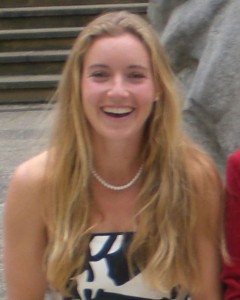Emily Kalah Gade, Ph.D. candidate, Political Science
Neighborhood: Ballard
Area of study, as you would tell your advisor: Political violence and civil resistance
Area of study, as you would tell your family: Civil war/terrorism, nonviolent resistance
Emily Kalah Gade, a Ph.D. candidate in Political Science, has been busy. In the past month or so, several of her op-eds on the women’s movement under the Trump administration have been published in the Washington Post and Huffington Post. That’s in addition to her research, which focuses on civilians in conflict zones, political violence, nonviolent resistance and post-conflict development. This year, Gade will start a three-year Moore/Sloan & WRF Innovation in Data Science Postdoctoral Fellowship. When she’s not studying, Gade can be found training – she has competed in rowing at the national and international level, including the 2012 US Olympic Trials. Gade shared a few tips with us on how she gets it all done.
Work
Give us a one-word description of how you work:
Structure
How do you manage your to-dos?
Reminders on iPhone, hand-written notebook
What are your essential apps, software or tools?
Word, R, Hadoop
Where do you most often work?
Home.
How do you manage your time?
Professionally, I like structure, so I plan out what I want in five years (or three or one) and then look up people who have done that, read their CVs and try to figure out what seems to help get them there. Then, I work backwards. What do I need to do to get to the next step forward in my process? I set up deadlines for myself and stick to them.
On a day-to-day basis, I work out and walk my dog every day, make sure I get enough sleep, stop working and take a break when my mind wanders but get back to it before I get too distracted. Saying no to things that don’t help you achieve your goals or live your values is also critical to success (for me). I also think being happy with your life is probably the most important part of time management. If I’m unhappy or stressed out about something I am rarely productive. At various points that has involved making lifestyle changes and seeking external guidance and support, but usually exercise does it for me.
What is your best time-saving shortcut?
Deleting Facebook.
What are some of your productivity strategies you’ve honed over your years in academia?
Since the nature of academia is almost completely unstructured, I like to paint myself into a corner to make sure I get things done. I’ll email a friend or colleague and say “would you have time to give me feedback on [this assignment] if I sent it to you by [this date]?” I do this even if I don’t have a “real” deadline. The other important part of that is to actually do it when you say you will. For me, the key to this is to not be a perfectionist. I just send whatever it is on that date no matter what state it is in, and describe what kind of feedback I’m looking for given where the work is at. This model of course means you are “exposed” in that you send your ideas out the door before they are ready. That can be hard because it opens you up to criticism, so it requires that you divorce your sense of self and self-worth from your academic identity.
Life
What mundane thing are you really exceptional at?
I’m not really exceptional at anything — more of a generalist.
What are you currently reading for pleasure?
Empire of Storms by Sarah J. Maas (a little sci fi to counteract all the terrorism research).
What’s the last thing that made you laugh?
The dog I’m dog-sitting.
How do you recharge?
Exercise, play outside, go into the backcountry for a week or weekend without access to internet.
What’s your sleep routine like?
I try to sleep eight hours a night, wake up around 5:30 a.m. or 6 a.m. and get to bed on time.
Inspiration
What’s the best advice you’ve ever received?
Choices exclude other choices; little things or even semi-big things at work don’t define you.
Who’s your support system?
Loved ones, my dog.
What do you wish you had started doing sooner in grad school?
Caring less. That sounds strange but as I became more confident I got less wrapped up in each little thing and what everyone else thought of me. That let me take more risks and to go after things more fully, and some of those have paid off.
Stopped doing sooner?
Trying to make other people happy — it’s impossible anyway and not the right goal.
How UW Works was inspired by LifeHacker’s How I Work.
Did you enjoy this series? Check back Wednesdays during the Spring quarter for the latest mid-week motivation! While you wait, you can read more in this series, nominate a student or professor to be featured, or answer the questions yourself! (Students should answer the questions via this form; faculty should use this form. If you prefer to answer the questions over email, drop us a line at gradnews@uw.edu).